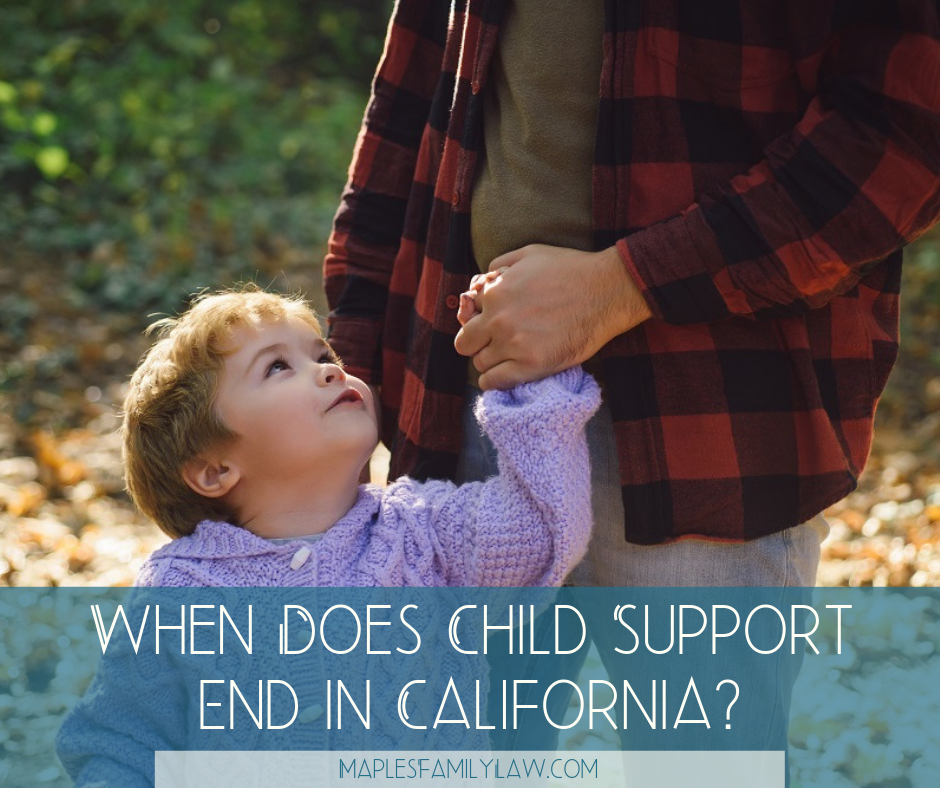 Child Support
Child Support
When Does Child Support End in California?
If you’re a parent who pays child support because your kids live with their other parent, or if you’re contemplating divorce and you’re fairly sure that your kids won’t live with you most of the time, you’re not alone in wondering when child support ends in California. Here’s what you need to know.
When Does Child Support End in California?
 In California, a non-custodial parent pays child support until his or her child turns 18 – but there are some circumstances in which the paying parent continues to pay the obligation after that time. Typically, a paying parent must continue to pay if the child hasn’t graduated from high school and still lives at home with the receiving parent. In that case, child support stops when the child turns 19.
In California, a non-custodial parent pays child support until his or her child turns 18 – but there are some circumstances in which the paying parent continues to pay the obligation after that time. Typically, a paying parent must continue to pay if the child hasn’t graduated from high school and still lives at home with the receiving parent. In that case, child support stops when the child turns 19.
Related: What are the child support laws in California?
Can Child Support End Early?
In some cases, the paying parent can stop paying child support before the child turns 18. Those circumstances include when the child:
- Gets married
- Joins the military
- Becomes emancipated
- Passes away
Related: 5 myths about child support in California
Child Support Obligations: More Than Just Money
Child support isn’t only a financial payment each month. It also includes things like healthcare coverage (such as medical, vision and dental). Most child care expenses – including the financial obligation – are split 50-50 between the parents; it’s just that one parent often has the child for less time throughout the month, and in many cases, one parent makes more money than the other does.
Still, both parents are responsible for financially providing for their children.
Do Child Support Payments Have to End When a Child is Old Enough?
 Parents can agree to pay child support for as long as they want to (as long as the child has reached the age of majority or meets one of the other conditions required to stop payments, like military service or marriage). If you or your spouse says you’re willing to continue paying child support during the time your child is in college, for example, you can write it in your divorce agreement.
Parents can agree to pay child support for as long as they want to (as long as the child has reached the age of majority or meets one of the other conditions required to stop payments, like military service or marriage). If you or your spouse says you’re willing to continue paying child support during the time your child is in college, for example, you can write it in your divorce agreement.
Because California doesn’t automatically require child support to continue past the age of 18, even in cases of children with special needs, many parents do agree to continue support for longer. There’s nothing to stop you from doing so, as well, if it’s necessary in your case. The key is that you must both agree.
Do You Have to Agree on a Child Support Amount?
Under California law, parents don’t have a lot of say in the amount of child support that changes hands – unless they want to pay more than what the state’s guidelines suggest. For example, you can’t go to court and say, “We agreed that I will only pay $100 a month in child support,” and expect the judge to automatically agree. The state has specific guidelines on how much money a non-custodial parent has to pay for the care of his or her children, and unless you have special circumstances, the court isn’t going to deviate from the guidelines.
If one parent doesn’t want to pay child support, that parent is most likely out of luck. The courts recognize that both parents are required to provide for their children.
Related: What is parentage by estoppel?
What is Child Support For?
Child support is money intended to help pay for a child’s expenses. It doesn’t matter if someone receives a child support payment and uses it to pay the rent or buy groceries that will feed other people in the house – it’s a contribution to the family’s community money that helps keep the child’s standard of living intact.
Do You Need to Talk to a Lawyer About When Child Support Ends in California?
If you need to talk to an attorney about when child support stops in California or what you may be ordered to pay (or receive), we can help.
Call us right away at (209) 546-6870 or get in touch with a Stockton divorce attorney online to schedule a consultation today.